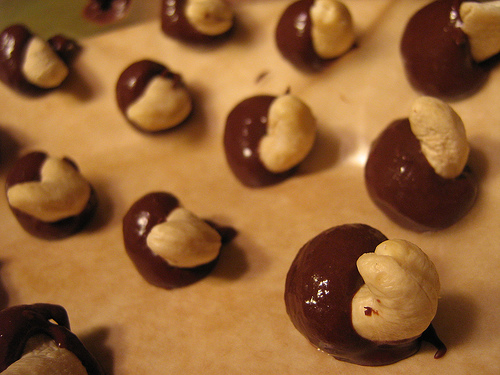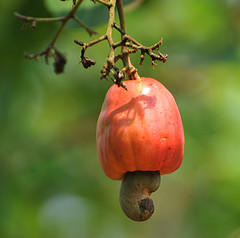Welcome!
At first glance, the above images all seem to represent different things. They are all different colors, different shapes, and seemingly different organisms. It may come as a surprise then that the 3 photos above are all taken of Anacardium occidentale, or the Cashew Tree.
Anacardium occidentale gets its name from the Greed
words "Ana-", meaning "without", and "cardium", meaning "a heart." Occidentale
is Latin for "from the west." As the name suggests, this plant is native to the
Western Hemisphere. The genus name is actually more specific, referring to how
the pulp of the fruit has the nut growing outside of it rather than inside!
Anacardium occidentale
is a fairly large spreading and fast growing tree that is
native to Brazil. It has evergreen leaves and in favorable conditions can
grow up to 40-50 feet. The tree produces aromatic yellow and pink small flowers,
which typically have 5 petals and are pollinated mostly by bees. The tree also
produces a two-piece fruit, one part called the Cashew Apple and one being the
Cashew Nut.
 The
Cashew Apple is also called the “pseudo fruit,” due to the fact that it is
actually just the swollen stalk. The cashew apple is actually pear shaped, plump
and fragrant. It can grow to be 5-11cm in length. This fruit is edible and
apparently quite tasty, however is only ripe for a short period of time and
tends to go bad after approximately 24 hours, which is why they are mostly
discarded.
The
Cashew Apple is also called the “pseudo fruit,” due to the fact that it is
actually just the swollen stalk. The cashew apple is actually pear shaped, plump
and fragrant. It can grow to be 5-11cm in length. This fruit is edible and
apparently quite tasty, however is only ripe for a short period of time and
tends to go bad after approximately 24 hours, which is why they are mostly
discarded.
The Cashew nut actually grows first, and the apple grows out of it. This is the kidney shaped and thick shelled “true fruit” that contains the kernel (the cashew as we know it) as well as thick cashew nut shell oil( CNSL). This oil contains cardol and anacardic acid and is quite toxic. The nuts must be roasted to expel this oil before contact with humans, and unroasted nuts should never be eaten.
Little-Known Facts
-In its native Northeastern Brazil, many people believe
that if the Cashew Tree is flowering during the time of a lunar
eclipse, the moon will burn the tree's flowers, resulting in a
poor harvest for the season.
-The nuts are very nutritious (and
delicious!) food, containing approximately 30% carbohydrates and
15% protein.
-Natives of Northeastern Brazil often use the
CNSL oil to tattoo themselves.
Return to
multipleorganisms.net
![]()



